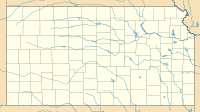United States Senate election in Kansas, 2020 (August 4 Republican primary)
- Primary date: Aug. 4
- Primary type: Semi-closed
- Registration deadline(s): July 14
- Online registration: Yes
- Same-day registration: No
- Early voting starts: July 15
- Absentee/mail voting deadline(s): Aug. 4 (postmarked)
- Voter ID: Photo ID
- Poll times: 7 a.m. to 7 p.m.
2026 →
← 2014
|
| U.S. Senate, Kansas |
|---|
| Democratic primary Republican primary General election |
| Election details |
| Filing deadline: June 1, 2020 |
| Primary: August 4, 2020 General: November 3, 2020 Pre-election incumbent: Pat Roberts (Republican) |
| How to vote |
| Poll times: 7 a.m. to 7 p.m. Voting in Kansas |
| Race ratings |
Inside Elections: Tilt Republican Sabato's Crystal Ball: Lean Republican |
| Ballotpedia analysis |
| U.S. Senate battlegrounds U.S. House battlegrounds Federal and state primary competitiveness Ballotpedia's Election Analysis Hub, 2020 |
| See also |
U.S. Senate • 1st • 2nd • 3rd • 4th Kansas elections, 2020 U.S. Congress elections, 2020 U.S. Senate elections, 2020 U.S. House elections, 2020 |
Roger Marshall defeated Kris Kobach, Bob Hamilton, and eight others in the Republican primary for U.S. Senate in Kansas on August 4, 2020. Marshall received 40% of the vote followed by Kobach and Hamilton with 26% and 19%, respectively. No other candidate received over 10% of the vote.[1]
Incumbent Pat Roberts (R), who was first elected in 1996, did not seek re-election. The last time Kansas had an open Senate seat was in 2010. Roberts endorsed Marshall on July 21, 2020. To view other noteworthy endorsements in the race, click here.
Hamilton, Kobach, and Marshall led the candidate field in endorsements, fundraising, and media coverage.
Hamilton, a former owner of a plumbing business, said he was a political outsider who would bring his business savvy to Washington. Hamilton said he would be a citizen legislator who would work to limit lobbyists' influence.[2]
Kobach, who served as Kansas Secretary of State between 2011 and 2019 and was the Republican nominee for governor in 2018, said he was "[c]ommitted to restoring the Constitution to the Founders’ intent, limiting the size of government and solving the humanitarian crisis at the border."[3]
At the time of the 2020 election, Marshall represented Kansas' 1st Congressional District, having first won election in 2016. He said he had a record of accomplishments in the House including sitting on the Agriculture Committee, ensuring that protections for crop insurance were included in the Farm Bill, and passing a bill to reduce tax rates.[4]
Lance Berland, John Berman, Derek Ellis, Dave Lindstrom, Brian Matlock, John Miller, Steve Roberts, and Gabriel Mark Robles also ran in the primary.
Click here to read about noteworthy events that occurred during the primary.
Major independent observers rated the general election as Lean Republican or Likely Republican. Heading into the general election, Kansas had not elected a Democratic senator since 1932.[5] In 2018, Kansas elected Democratic Gov. Laura Kelly, who defeated Kobach by five percentage points.
Thirty-three of the Senate's 100 seats were up for election in November, in addition to two special elections. Heading into the general election, the Republican Party held a majority in the chamber with 54 seats. There were 47 Democrats, and the remaining two members of the chamber were independents who caucused with the Democratic Party. Click here to learn more about what was at stake in the general election.
Click on candidate names below to view their key messages:
 Hamilton |
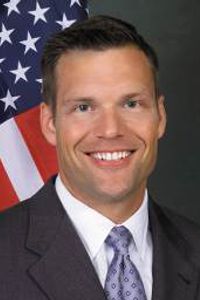 Kobach |
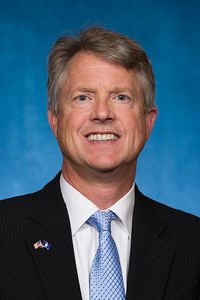 Marshall |
![]() For more information about the Democratic primary, click here.
For more information about the Democratic primary, click here.
![]() For more information about the general election, click here.
For more information about the general election, click here.
Election procedure changes in 2020
Ballotpedia provided comprehensive coverage of how election dates and procedures changed in 2020. While the majority of changes occurred as a result of the coronavirus (COVID-19) pandemic, some changes occurred for other reasons.
Political party events in Kansas were modified as follows:
- Political party events: The Democratic Party of Kansas canceled in-person voting in its presidential preference primary, originally scheduled to take place on May 2, 2020. Voting instead took place by mail. The receipt deadline for mail-in ballots was May 2.
For a full timeline about election modifications made in response to the COVID-19 outbreak, click here.
Candidates and election results
Republican primary election
Republican primary for U.S. Senate Kansas
Candidate | % | Votes | ||
| ✔ |  | Roger Marshall | 40.3 | 167,800 |
 | Kris Kobach | 26.1 | 108,726 | |
 | Bob Hamilton | 18.7 | 77,952 | |
 | Dave Lindstrom | 6.6 | 27,451 | |
 | Steve Roberts | 2.0 | 8,141 | |
 | Brian Matlock  | 1.7 | 7,083 | |
| Lance Berland | 1.5 | 6,404 | ||
| John Miller | 1.1 | 4,431 | ||
 | Derek Ellis | 1.0 | 3,970 | |
| Gabriel Mark Robles | 0.9 | 3,744 | ||
 | John Berman | 0.2 | 861 | |
| Total votes: 416,563 (100.00% precincts reporting) | ||||
 = candidate completed the Ballotpedia Candidate Connection survey. = candidate completed the Ballotpedia Candidate Connection survey. | ||||
| If you are a candidate and would like to tell readers and voters more about why they should vote for you, complete the Ballotpedia Candidate Connection Survey. | ||||
Do you want a spreadsheet of this type of data? Contact our sales team. | ||||
Withdrawn or disqualified candidates
- Bryan Pruitt (R)
- Jacob LaTurner (R)
- Susan Wagle (R)
Candidate profiles
This section includes candidate profiles created in one of two ways. Either the candidate completed Ballotpedia's Candidate Connection survey or Ballotpedia staff created a profile after identifying the candidate as noteworthy.[6] Ballotpedia staff compiled profiles based on campaign websites, advertisements, and public statements.
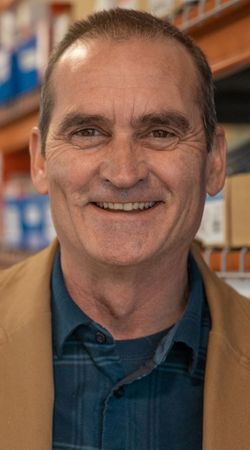
Party: Republican Party
Incumbent: No
Political Office: None
Biography: Hamilton started his plumbing business, Bob Hamilton Plumbing, in 1983. In 2011, he and his wife started a nonprofit called Giving the Basics, which donates personal hygiene products.
Show sources
This information was current as of the candidate's run for U.S. Senate Kansas in 2020.
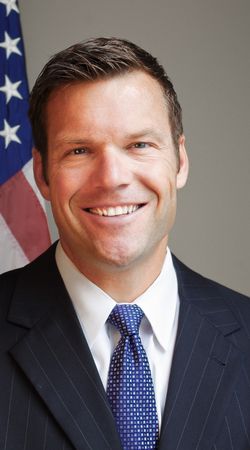
Party: Republican Party
Incumbent: No
Political Office:
Kansas Secretary of State (2011-2019)
Biography: Kobach received a B.A. from Harvard University, a doctorate in political science from Oxford University, and a J.D. from Yale Law School. He worked as a law clerk for Judge Deanell Tacha on the United States Court of Appeals for the Tenth Circuit and was a professor of constitutional law at the University of Missouri-Kansas City. Kobach was a White House Fellow and worked as a chief advisor and counsel to Attorney General John Ashcroft in the Bush administration.
Show sources
This information was current as of the candidate's run for U.S. Senate Kansas in 2020.
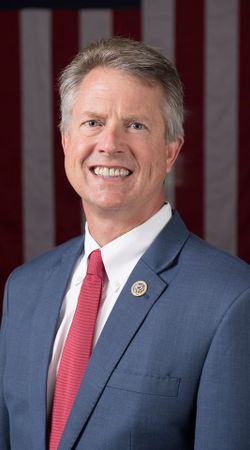
Party: Republican Party
Incumbent: No
Political Office:
U.S. House (Assumed office: 2017)
Biography: Marshall graduated with a B.S. in biochemistry from Kansas State University and an M.D. from the University of Kansas. He served in the U.S. Army Reserves from 1984-1991. Marshall practiced medicine as an OB/GYN in Great Bend, Kansas, and served as chairman of the board of Great Bend Regional Hospital.
Show sources
Sources: Roger Marshall 2020 campaign website, "Home," accessed May 3, 2020, Roger Marshall 2020 campaign website, "Issues," accessed May 3, 2020; Biographical Directory of the United States Congress, "MARSHALL, Roger Wayne (1960-)," accessed May 3, 2020, Congressman Roger Marshall, "About Me," accessed May 3, 2020, Roger Marshall 2020 campaign website, "Meet Doc," accessed May 3, 2020
This information was current as of the candidate's run for U.S. Senate Kansas in 2020.
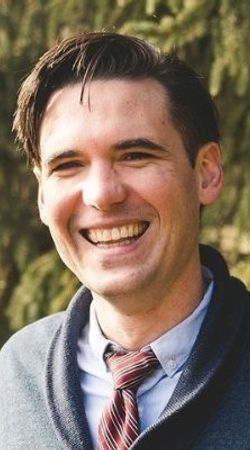
Party: Republican Party
Incumbent: No
Political Office: None
Submitted Biography: "Brian Matlock is running for the open Kansas US Senate seat as a Republican Socialist. The current partisan finger-pointing is unproductive and is producing negative results for Kansas towns. There is a lot of overlap between good-neighbor Republicans and common sense Socialists; both groups value showing up, pitching in, and doing what it takes to get the job done.Brian wants to cut through the corruption and obstruction within both parties and form a coalition of Kansans who are focused on making our communities better. The campaign will be going from town to town, talking with folks who have been at the losing end of irresponsible financial and political practices. We will be organizing low- to middle-income Kansans against big industry and in favor of big, bold policy change that will revitalize our dying towns.Through his proposed Federally Funded Locally Administered Job Guarantee program, local folks will be at the frontlines of deciding how an influx of money should be spent in their communities. We look forward to criss-crossing Kansas over the next several months to get a better idea of what type of projects Kansans would take on if the Federal Government were to invest in their communities."
![]()
This information was current as of the candidate's run for U.S. Senate Kansas in 2020.
Noteworthy primary endorsements
This section includes noteworthy endorsements issued in the primary, added as we learn about them. Click here to read how we define noteworthy primary endorsements. If you are aware of endorsements that should be included, please email us.
| Republican primary endorsements | ||||||
|---|---|---|---|---|---|---|
| Endorsement | Hamilton | Kobach | Lindstrom | Marshall | ||
| Newspapers and editorials | ||||||
| The Wichita Eagle[7] | ✔ | |||||
| Elected officials | ||||||
| U.S. Sen. Pat Roberts (R- Kan.)[8] | ✔ | |||||
| Individuals | ||||||
| Former U.S. Sen. Jim DeMint (R-S.C.)[9] | ✔ | |||||
| 1996 presidential candidate Bob Dole (R-Kan.)[10] | ✔ | |||||
| Organizations | ||||||
| American Workers Coalition[11] | ✔ | |||||
| Gun Owners of America[12] | ✔ | |||||
| National Association for Gun Rights[13] | ✔ | |||||
| National Border Patrol Council[14] | ✔ | |||||
| National Right to Life[15] | ✔ | |||||
| Operation Rescue[16] | ✔ | |||||
| U.S. Chamber of Commerce[17] | ✔ | |||||
Timeline
2020
Campaign advertisements
This section shows advertisements released in this race. Ads released by campaigns and, if applicable, satellite groups are embedded or linked below. If you are aware of advertisements that should be included, please email us.
Bob Hamilton
Supporting Hamilton
|
|
|
|
|
|
|
|
|
|
|
|
|
|
|
|
Opposing Marshall
|
|
Kris Kobach
Supporting Kobach
|
|
|
|
Opposing Marshall
|
Dave Lindstrom
|
|
Roger Marshall
Supporting Marshall
|
|
|
|
|
|
|
|
|
|
|
|
Opposing Hamilton
|
Opposing Kobach
|
|
Brian Matlock
|
Satellite group ads
| Click "show" to the right to see satellite group ads. | ||||||||||||||||||||
|---|---|---|---|---|---|---|---|---|---|---|---|---|---|---|---|---|---|---|---|---|
|
Supporting Kobach Opposing Marshall
Supporting Marshall
Opposing Kobach
| ||||||||||||||||||||
Polls
- See also: Ballotpedia's approach to covering polls
| United States Senate election in Kansas, 2020: Republican primary polls | |||||||||||
|---|---|---|---|---|---|---|---|---|---|---|---|
| Poll | Date | Someone else | Undecided | Margin of error | Sample size | Sponsor | |||||
| Civiqs | May 30-June 1, 2020 | 15% | 35% | 4% | 26% | N/A | 4% | 16% | 4.2 | 699 | Daily Kos |
| McLaughlin & Associates | Feb. 12-16, 2020 | 2% | 40% | 5% | 23% | 9% | N/A | 21% | 5.6 | 300 | Kris Kobach |
Campaign finance
This section contains campaign finance figures from the Federal Election Commission covering all candidate fundraising and spending in this election.[49] It does not include information on fundraising before the current campaign cycle or on spending by satellite groups. The numbers in this section are updated as candidates file new campaign finance reports. Candidates for Congress are required to file financial reports on a quarterly basis, as well as two weeks before any primary, runoff, or general election in which they will be on the ballot and upon the termination of any campaign committees.[50] The chart below contains data from financial reports submitted to the Federal Election Commission.
| Name | Party | Receipts* | Disbursements** | Cash on hand | Date |
|---|---|---|---|---|---|
| Lance Berland | Republican Party | $0 | $0 | $0 | Data not available*** |
| John Berman | Republican Party | $0 | $0 | $0 | Data not available*** |
| Derek Ellis | Republican Party | $0 | $0 | $0 | Data not available*** |
| Bob Hamilton | Republican Party | $3,977,674 | $3,930,904 | $46,770 | As of December 31, 2020 |
| Kris Kobach | Republican Party | $1,149,415 | $1,138,693 | $10,722 | As of December 31, 2020 |
| Dave Lindstrom | Republican Party | $731,753 | $731,753 | $0 | As of September 30, 2020 |
| Roger Marshall | Republican Party | $6,772,872 | $7,171,199 | $209,959 | As of December 31, 2020 |
| Brian Matlock | Republican Party | $21,738 | $20,412 | $1,326 | As of September 30, 2020 |
| John Miller | Republican Party | $5,015 | $0 | $0 | As of October 15, 2020 |
| Steve Roberts | Republican Party | $0 | $0 | $0 | Data not available*** |
| Gabriel Mark Robles | Republican Party | $0 | $0 | $0 | Data not available*** |
|
Source: Federal Elections Commission, "Campaign finance data," 2020. This product uses the openFEC API but is not endorsed or certified by the Federal Election Commission (FEC).
* According to the FEC, "Receipts are anything of value (money, goods, services or property) received by a political committee." |
|||||
Candidate self-funding
The following candidates contributed or loaned their own money to their campaigns:
- Bob Hamilton loaned his campaign $2 million on March 30, 2020, and $1.5 million on June 24, 2020.[51][52]
- Kris Kobach contributed $1,000 to his campaign on July 11, 2019.[53]
- Dave Lindstrom loaned his campaign $140,000 in three installments: $25,000 on April 1, 2019, $100,000 on September 30, 2019, and $15,000 on December 31, 2019.[54] He contributed $1,500 to his campaign on June 30, 2020.[55]
- Brian Matlock contributed $5,889.08 to his campaign in 54 separate payments between October 4, 2019, and March 9, 2020.[56][57]
Satellite spending
- See also: Satellite spending
Satellite spending, commonly referred to as outside spending, describes political spending not controlled by candidates or their campaigns; that is, any political expenditures made by groups or individuals that are not directly affiliated with a candidate. This includes spending by political party committees, super PACs, trade associations, and 501(c)(4) nonprofit groups.[58][59][60]
This section lists satellite spending in this race reported by news outlets in alphabetical order. If you are aware of spending that should be included, please email us.
- Club for Growth Action spent $33,000 on newspaper and digital ads featuring criticisms of Marshall, The Washington Times reported on March 16.[44] On March 31, Politico reported that the group would spend $2.1 million on television ads opposing Marshall running June 9 through August 4.[43] On June 29, Politico reported that the group was suspending its TV advertising in the primary. Club for Growth President David McIntosh said, "We continue to believe Rep. Marshall is not a strong pro-growth candidate. ... But the Club for Growth PAC is not endorsing in this race, and Club for Growth Action will be deploying resources in other critical House and Senate primaries."[25] According to The New York Times, President Trump asked McIntosh to stop running the ads.[26]
- Free Forever PAC spent $70,000 on a negative ad against Marshall on Fox News, The Kansas City Star reported on March 13.[45] On July 21, Daily Kos reported that the group was spending $365,000 on an ad supporting Kobach.[20]
- Keep Kansas Great PAC booked $35,000 in airtime for a negative ad against Kobach and Club for Growth, Politico reported on April 29.[38]
- Plains PAC said it would spend $3 million on a television, radio and online ad campaign criticizing Kobach. The Associated Press reported the spending on July 7, 2020.[23]
- The Senate Leadership Fund booked $1.2 million in airtime for an ad campaign supporting Marshall, Politico reported on July 22.[19]
- The super PAC Sunflower State spent $850,000 on an ad campaign starting July 15. Media outlets wrote that the group had Democratic connections. According to Politico, one of the group's ads was "engineered to drive conservative voters toward Kobach. A narrator in the ad calls Kobach 'too conservative' because he 'won't compromise' on building President Donald Trump's border wall or on taking a harsher stance on relations with China. By contrast, the ad labels Marshall as a 'phony politician' who is 'soft on Trump.'"[21] According to the Associated Press, the group's spending on advertising in the race had increased to over $4 million as of July 24, 2020.[61]
- The U.S. Chamber of Commerce began a $400,000 ad campaign supporting Marshall on July 13, 2020.[22]
Interviews and questionnaires
Click the links below to view candidates' responses to interviews and questionnaires.
Debates and forums
July 20, 2020
The Fort Scott Area Chamber of Commerce and the Young Professionals League of Bourbon County hosted a candidate forum.
June 24, 2020
Kobach, Lindstrom, and Marshall participated in a debate about healthcare hosted by the Kansas Republican Party in Wichita, Kansas.
Coverage:
May 23, 2020
Hamilton, Kobach, Lindstrom, Marshall, and Wagle participated in a debate about agriculture hosted by the Kansas Republican Party in Manhattan, Kansas.
Coverage:
February 1, 2020
Kobach, Marshall, and Wagle participated in a debate at the Kansas Republican Party convention in Olathe, Kansas. A representative spoke on Lindstrom’s behalf due to a medical emergency.
Coverage:
Primaries in Kansas
A primary election is an election in which registered voters select a candidate that they believe should be a political party's candidate for elected office to run in the general election. They are also used to choose convention delegates and party leaders. Primaries are state-level and local-level elections that take place prior to a general election. In Kansas, parties decide who may vote in their primaries. As of October 2025, the Democratic Party held an open primary and the Republican Party held a closed primary. Regardless of the party's rules, an unaffiliated voter can declare their affiliation with a party on the day of the primary and vote in that party's primary. Previously affiliated voters who want to change their affiliation to vote in a different party's primary must do so before the candidate filing deadline, which is June 1 or the next business day.[62][63]
For information about which offices are nominated via primary election, see this article.
Noteworthy events
State Senate President Susan Wagle withdraws from race
State Senate President Susan Wagle withdrew from the race on May 28. She said, "Over the last few weeks I have spoken with Party leaders, including the National Republican Senatorial Committee. I share concerns that a divisive primary will only benefit the campaign of Barbara Bollier. ... I will not be part of a primary fight that will divide our Party or hurts my colleagues in the state legislature."[64]
Mike Pompeo declines to run
According to The Washington Post, U.S. Secretary of State Mike Pompeo (R) declined a May 2020 request from President Donald Trump (R) to join the race.[65] In an interview with Politico, Senate Majority Leader Mitch McConnell (R-Ky.) said, "[Pompeo] would obviously be my first choice and he has been for months."[66]
Kansas GOP chair asks Lindstrom and Wagle to drop out of primary
According to the Kansas City Star, Kansas Republican Party Chairman Mike Kuckelman sent letters to Lindstrom and then-candidate Susan Wagle (R) on April 23 asking them to drop out of the Republican primary. Kuckelman wrote, "[F]ailure to suspend your campaign could negatively impact the outcome of the race — something we’ve seen in recent Kansas history — and could possibly cost Kansas Republicans the U.S. Senate seat." He also wrote, "It is time to allow our Party to coalesce behind a candidate who will not only win, but will help Republicans down the ballot this November."[39]
In response, Lindstrom said, "The polling information I have, it says that I can win." Wagle's campaign representative Matt Beynon said, "Private conversations with Mike Kuckelman over the past year have made it clear he’s been opposed to Susan’s campaign from the start, and today, he simply put that on paper. Others can speculate on his motives, but it may be as simple as he doesn’t support strong, pro-life conservative women."[39]
State party executive director Shannon Golden said the party wanted a contest between Kobach and Marshall but that the party did not favor either candidate.[39]
Kobach said of Kuckelman's letters, "Grassroots Republicans should be outraged. Our next Senator will be chosen by the people of Kansas — not the party elites. The Chairman’s attempted intervention into the GOP primary is inappropriate." Marshall's campaign representative Eric Pahls said, "The last thing Kobach wants [is] a one-on-one race with Dr. Marshall. … While we can’t control what others do, we can keep working harder than anyone."[39]
Lindstrom and Kobach called on Kuckelman to resign the following week.[67]
The state party did not send letters to the three other candidates in the race.[39]
What was at stake in the general election?
U.S. Senate elections were held on November 3, 2020, and coincide with the 2020 presidential election. Thirty-three of the Senate's 100 seats were up for regular election in November. There were also two special elections in 2020. The results determined control of the U.S. Senate in the 117th Congress.
At the time of the election, the Republican Party had a 53-seat Senate majority, while Democrats had 45 seats. There were also two independents who caucus with the Democratic Party. Republicans faced greater partisan risk than Democrats in 2020 because they were defending 23 seats compared to 12 for the Democrats. Both parties had two incumbents representing states the opposite party's presidential nominee won in 2016.
In 2018, Democrats and Democratic-caucusing independents defended 26 of the 35 seats up for election, while Republicans defended the other nine. Republicans won 11 seats to the Democrats' 24, for a GOP net gain of two.
In the 24 previous Senate elections that coincided with a presidential election, the president's party had gained Senate seats in 16 elections and lost seats in nine. In years where the president's party gained seats, the average gain was three seats. In years where the president's party lost seats, the average loss was five seats. Click here for more information on presidential partisanship and down-ballot outcomes.
General election race ratings
- See also: Race rating definitions and methods
Ballotpedia provides race ratings from four outlets: The Cook Political Report, Inside Elections, Sabato's Crystal Ball, and DDHQ/The Hill. Each race rating indicates if one party is perceived to have an advantage in the race and, if so, the degree of advantage:
- Safe and Solid ratings indicate that one party has a clear edge and the race is not competitive.
- Likely ratings indicate that one party has a clear edge, but an upset is possible.
- Lean ratings indicate that one party has a small edge, but the race is competitive.[68]
- Toss-up ratings indicate that neither party has an advantage.
Race ratings are informed by a number of factors, including polling, candidate quality, and election result history in the race's district or state.[69][70][71]
| Race ratings: U.S. Senate election in Kansas, 2020 | |||||||||
|---|---|---|---|---|---|---|---|---|---|
| Race tracker | Race ratings | ||||||||
| November 3, 2020 | October 27, 2020 | October 20, 2020 | October 13, 2020 | ||||||
| The Cook Political Report | Lean Republican | Lean Republican | Lean Republican | Lean Republican | |||||
| Inside Elections with Nathan L. Gonzales | Tilt Republican | Tilt Republican | Tilt Republican | Lean Republican | |||||
| Larry J. Sabato's Crystal Ball | Lean Republican | Lean Republican | Lean Republican | Lean Republican | |||||
| Note: Ballotpedia updates external race ratings every week throughout the election season. | |||||||||
Election history
2016
| Party | Candidate | Vote % | Votes | |
|---|---|---|---|---|
| Republican | 62.2% | 732,376 | ||
| Democratic | Patrick Wiesner | 32.2% | 379,740 | |
| Libertarian | Robert Garrard | 5.6% | 65,760 | |
| N/A | Write-in | 0% | 46 | |
| Total Votes | 1,177,922 | |||
| Source: Kansas Secretary of State | ||||
2014
| Party | Candidate | Vote % | Votes | |
|---|---|---|---|---|
| Republican | 53.1% | 460,350 | ||
| Independent | Greg Orman | 42.5% | 368,372 | |
| Libertarian | Randall Batson | 4.3% | 37,469 | |
| Total Votes | 866,191 | |||
| Source: Kansas Secretary of State Official Results | ||||
2010
On November 2, 2010, Moran (R) won election to the United States Senate. He defeated Lisa Johnston (D), Michael Wm. Dann (L), and Joseph K. Bellis (Reformed Party) in the general election.[72]
State profile
- See also: Kansas and Kansas elections, 2020
Partisan data
The information in this section was current as of April 30, 2020.
Presidential voting pattern
- Kansas voted Republican in all seven presidential elections between 2000 and 2024.
Congressional delegation
- Following the 2018 elections, both U.S. Senators from Kansas were Republicans.
- Kansas had one Democratic and three Republican U.S. Representatives.
State executives
- Democrats held five and Republicans held 12 of Kansas' 24 state executive offices. Elections for the other offices are nonpartisan.
- Kansas' governor was Democrat Laura Kelly.
State legislature
- Republicans controlled the Kansas State Senate with a 28-11 majority.
- Republicans controlled the Kansas House of Representatives with a 84-41 majority.
Kansas Party Control: 1992-2026
No Democratic trifectas • Sixteen years of Republican trifectas
| Year | 92 | 93 | 94 | 95 | 96 | 97 | 98 | 99 | 00 | 01 | 02 | 03 | 04 | 05 | 06 | 07 | 08 | 09 | 10 | 11 | 12 | 13 | 14 | 15 | 16 | 17 | 18 | 19 | 20 | 21 | 22 | 23 | 24 | 25 | 26 |
|---|---|---|---|---|---|---|---|---|---|---|---|---|---|---|---|---|---|---|---|---|---|---|---|---|---|---|---|---|---|---|---|---|---|---|---|
| Governor | D | D | D | R | R | R | R | R | R | R | R | D | D | D | D | D | D | D | D | R | R | R | R | R | R | R | R | D | D | D | D | D | D | D | D |
| Senate | R | R | R | R | R | R | R | R | R | R | R | R | R | R | R | R | R | R | R | R | R | R | R | R | R | R | R | R | R | R | R | R | R | R | R |
| House | D | R | R | R | R | R | R | R | R | R | R | R | R | R | R | R | R | R | R | R | R | R | R | R | R | R | R | R | R | R | R | R | R | R | R |
|
|
| Demographic data for Kansas | ||
|---|---|---|
| Kansas | U.S. | |
| Total population: | 2,906,721 | 316,515,021 |
| Land area (sq mi): | 81,759 | 3,531,905 |
| Race and ethnicity** | ||
| White: | 85.2% | 73.6% |
| Black/African American: | 5.8% | 12.6% |
| Asian: | 2.6% | 5.1% |
| Native American: | 0.8% | 0.8% |
| Pacific Islander: | 0.1% | 0.2% |
| Two or more: | 3.3% | 3% |
| Hispanic/Latino: | 11.2% | 17.1% |
| Education | ||
| High school graduation rate: | 90.2% | 86.7% |
| College graduation rate: | 31% | 29.8% |
| Income | ||
| Median household income: | $52,205 | $53,889 |
| Persons below poverty level: | 15% | 11.3% |
| Source: U.S. Census Bureau, "American Community Survey" (5-year estimates 2010-2015) Click here for more information on the 2020 census and here for more on its impact on the redistricting process in Kansas. **Note: Percentages for race and ethnicity may add up to more than 100 percent because respondents may report more than one race and the Hispanic/Latino ethnicity may be selected in conjunction with any race. Read more about race and ethnicity in the census here. | ||
See also
- United States Senate election in Kansas, 2020 (August 4 Democratic primary)
- United States Senate election in Kansas, 2020
- United States Senate Democratic Party primaries, 2020
- United States Senate Republican Party primaries, 2020
- United States Senate elections, 2020
- U.S. Senate battlegrounds, 2020
External links
Footnotes
- ↑ The New York Times, "Kansas U.S. Senate Primary Election Results," accessed August 4, 2020
- ↑ Bob Hamilton 2020 campaign website, "Home," accessed May 15, 2020
- ↑ Facebook, "Kris Kobach on May 20, 2020," accessed May 26, 2020
- ↑ Roger Marshall 2020 campaign website, "Meet Doc," accessed May 15, 2020
- ↑ The Economist, "Could Democrats pick up a Senate seat in Kansas?" July 11, 2020
- ↑ Candidate Connection surveys completed before September 26, 2019, were not used to generate candidate profiles. In battleground primaries, Ballotpedia based its selection of noteworthy candidates on polling, fundraising, and noteworthy endorsements. In battleground general elections, all major party candidates and any other candidates with the potential to impact the outcome of the race were included.
- ↑ 7.0 7.1 The Wichita Eagle, "Wichita Eagle endorsement: U.S. Senate Republican primary," July 31, 2020
- ↑ 8.0 8.1 The Kansas City Star, "Pat Roberts picks preferred successor, endorses Marshall over Kobach in Kansas race," July 21, 2020
- ↑ 9.0 9.1 Leavenworth Times, "Jim DeMint: Kris Kobach has his vote for U.S. Senate," July 27, 2020
- ↑ The Kansas City Star, "Bob Dole endorses Kansas Rep. Roger Marshall in Senate race," January 13, 2020
- ↑ Kris W. Kobach on June 6, 2020," accessed June 10, 2020
- ↑ Kris Kobach 2020 campaign website, "Gun Owners of America Endorses Kobach for Senate," January 14, 2020
- ↑ Kris Kobach 2020 campaign website, "National Association for Gun Rights Endorses Kobach for U.S. Senate," January 11 2020
- ↑ Kris Kobach 2020 campaign website, "National Association for Gun Rights Endorses Kobach for U.S. Senate," January 11 2020
- ↑ Twitter, "Dr. Roger Marshall on June 1, 2020," accessed June 10, 2020
- ↑ Twitter, "Kris W. Kobach on May 28, 2020," accessed June 10, 2020
- ↑ 17.0 17.1 The Kansas City Star, "U.S. Chamber of Commerce backs Marshall in Kansas Senate race, warns against Kobach," June 23, 2020
- ↑ Federal Election Commission, "Kansas - Senate," accessed July 27, 2020
- ↑ 19.0 19.1 Politico, "Republicans race to head off Kansas Senate nightmare," July 22, 2020
- ↑ 20.0 20.1 Daily Kos, "Morning Digest," July 21, 2020
- ↑ 21.0 21.1 Politico, "Mystery, Democratic-linked super PAC meddles in Kansas GOP primary," July 15, 2020
- ↑ 22.0 22.1 The Hill, "Conservative group launches ad campaign for Rep. Roger Marshall in Kansas Senate race," July 13, 2020
- ↑ 23.0 23.1 AP, "PAC launches campaign against Kobach in Kansas Senate race," July 7, 2020
- ↑ The Kansas City Star, "Kansas GOP scrubs final Senate primary debate after three candidates boycott over format," July 2, 2020
- ↑ 25.0 25.1 Politico, "Morning Score," June 29, 2020
- ↑ 26.0 26.1 The New York Times, "Why June Was Such a Terrible Month for Trump," July 2, 2020
- ↑ Twitter, "Medium Buying on June 24, 2020," accessed July 1, 2020
- ↑ KSN News, "GOP candidates Marshall, Lindstrom, and Kobach debate on healthcare," June 24, 2020
- ↑ Cite error: Invalid
<ref>tag; no text was provided for refs namedKCL - ↑ Daily Kos, "Daily Kos Elections Live Digest: 6/2," June 2, 2020
- ↑ KSNT, "Kansas candidate’s TV advertisement targeting China stirs up controversy, calls for removal," June 6, 2020
- ↑ KCTV 5, "Susan Wagle drops out of U.S. Senate race," May 28, 2020
- ↑ Cite error: Invalid
<ref>tag; no text was provided for refs namedKFL - ↑ KSN News, "Kansas GOP host second U.S. Senate debate," May 23, 2020
- ↑ Cite error: Invalid
<ref>tag; no text was provided for refs namedKLA - ↑ [1]
- ↑ Cite error: Invalid
<ref>tag; no text was provided for refs namedKFB - ↑ 38.0 38.1 Politico, "Morning Score," April 29, 2020
- ↑ 39.0 39.1 39.2 39.3 39.4 39.5 Kansas City Star, "Kansas GOP chair asks Wagle and Lindstrom to drop out of Senate race for good of party," April 23, 2020
- ↑ Federal Election Commission, "Kansas - Senate," accessed April 30, 2020
- ↑ Politico, "Morning Score," April 15, 2020
- ↑ Politico, "Morning Score," April 7, 2020
- ↑ 43.0 43.1 Politico, "Morning Score," March 31, 2020
- ↑ 44.0 44.1 The Washington Times, "Club for Growth takes aim at Marshall in heated Kansas GOP Senate primary," March 16, 2020
- ↑ 45.0 45.1 Kansas City Star, "Attack ad questions Marshall’s loyalty to Trump in effort to boost Kobach for Senate," March 13, 2020
- ↑ Kansas City Star, "Ex-Kansas Governor Colyer endorses Rep. Roger Marshall in Senate race," February 24, 2020
- ↑ Facebook, "Kris Kobach on February 19, 2020," accessed May 3, 2020
- ↑ The Topeka Capital-Journal, "Three U.S. Senate candidates cling to Trump at Kansas’ first GOP debate," February 1, 2020
- ↑ Fundraising by primary candidates can be found on the race's respective primary election page. Fundraising by general election candidates can be found on the race's general election page.
- ↑ Federal Election Commission, "2022 Quarterly Reports," accessed March 2, 2022
- ↑ Federal Election Commission, "Bob Hamilton for Kansas Inc. - Loan Information, April 2020 finance report," accessed May 15, 2020
- ↑ Federal Election Commission, "Bob Hamilton for Kansas Inc. - Loan Information, July quarterly finance report," accessed July 27, 2020
- ↑ Federal Election Commission, "Kobach for Senate - Itemized Receipts, October 2019 finance report," accessed May 15, 2020
- ↑ Federal Election Commission, "Lindstrom for Senate - Loan Information, Year-End 2019 finance report," accessed May 15, 2020
- ↑ Federal Election Commission, "Lindstrom for Senate - Itemized Receipts, July quarterly finance report," accessed July 27, 2020
- ↑ Federal Election Commission, "Brian Matlock for Senate - Itemized Receipts, April 2020 finance report," accessed May 15, 2020
- ↑ Federal Election Commission, "Brian Matlock for Senate - Itemized Receipts, Year-End 2019 finance report," accessed May 15, 2020
- ↑ OpenSecrets.org, "Outside Spending," accessed September 22, 2015
- ↑ OpenSecrets.org, "Total Outside Spending by Election Cycle, All Groups," accessed September 22, 2015
- ↑ National Review.com, "Why the Media Hate Super PACs," November 6, 2015
- ↑ Associated Press, "Kansas Senate race ads approach $14M, two-thirds from PACs," July 24, 2020
- ↑ Kansas Office of Revisor of Statutes, "Kan. Stat. Ann. § 25–3301," accessed October 15, 2025
- ↑ Kansas Office of Revisor of Statutes, "Kan. Stat. Ann. § 25–3304," accessed October 15, 2025
- ↑ Kansas City Star, "Kansas Republican Wagle drops out of Senate race after conversations with GOP leaders," May 28, 2020
- ↑ The Washington Post, "Trump encourages Pompeo to run for Senate but secretary of state rebuffs him," May 14, 2020
- ↑ Politico, "McConnell pines for Pompeo as Kansas chaos looms," May 14, 2020
- ↑ Dodge City Daily Globe, "U.S. Senate candidates Lindstrom, Kobach urge state GOP chairman to resign for distorting primary race," April 28, 2020
- ↑ Inside Elections also uses Tilt ratings to indicate an even smaller advantage and greater competitiveness.
- ↑ Amee LaTour, "Email correspondence with Nathan Gonzalez," April 19, 2018
- ↑ Amee LaTour, "Email correspondence with Kyle Kondik," April 19, 2018
- ↑ Amee LaTour, "Email correspondence with Charlie Cook," April 22, 2018
- ↑ U.S. Congress House Clerk, "Statistics of the Congressional Election of November 2, 2010," accessed March 28, 2013




